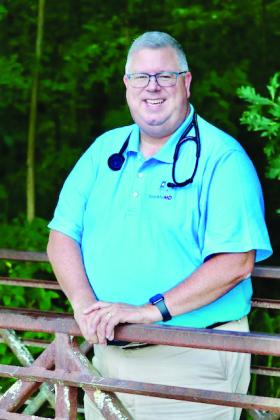Working with your physician to investigate your health plan may provide free or low-cost nutrition and/or fitness programs.
WHEN WE START A YEAR, thinking of resetting our lives is natural. Gyms, step counters, efficiency apps, and date books all get a lot of use in January and February. As someone who has spent a career in medicine, I never want to discourage my patients from making healthy and reasonable life choices. The problems are, of course, the words “healthy” and “reasonable.”
Choices, not resolutions According to driveresearch. com, nearly 40% of us will make resolutions at year’s end. Nearly half of those who make resolutions will choose diet or fitness as their year goals. These are great choices to make! Our diet has a direct and long-lasting impact on how we feel. It affects how we view ourselves and our overall energy levels and impacts our health in almost every way. Likewise, general fitness, mainly staying as active as possible and getting reasonable exercise, improves our overall health and prepares us to experience new and rewarding activities.
As a physician, my first guidance is not to make these choices as resolutions. The traditional New Year’s oath swearing tends to fall by the wayside by spring. Choosing to improve our diet and fitness shouldn’t be casual. It is a choice that will have lifelong benefits. Rather than saying, “I resolve to eat better and exercise,” I recommend that you commit, simply and sincerely, to making your health a priority in 2024.
Nutrition, not diet
First, consult with your physician no matter how you intend to improve your lifestyle. Both food and exercise, no matter how beneficial, can have adverse consequences if your choices don’t mix with current medications or physical readiness. Second, be wary of fad diets. They promise the world and deliver, at best, short-term results. If you are overweight or have other food-related health problems, the most important thing is to start with your physician. They can help you make choices safely, and they may have excellent referrals to organizations and support groups that will support you in this choice.
Fitness, not exercise
I cannot count the number of times I have treated fitness-related injuries. Naturally, many are legitimate— tripping while running or walking, slipping while biking, etc. However, many are caused by overexertion or improper practices.
Once again, your physician is your entry point to any fitness program. Not only will your medical provider generate some guardrails for safety, but he or she may also have access to a range of programs that may not be available through a general internet search.
Prioritize prevention
Still not convinced about making health a priority? Both good nutrition and general fitness have documented prevention benefits. Good nutrition can significantly reduce risks of cardiovascular problems, Type II diabetes, liver issues, and, of course, general weight gain.
Likewise, a solid, managed overall fitness program helps prevent ordinary injuries from everyday activities. Plus, if we become injured or need surgery, our general fitness level can reduce recovery time.
Not only is your doctor key to these decisions, but your health plan provider also has a vested interest in preventative practices.
Working with your physician to investigate your health plan may provide free or low-cost nutrition and/or fitness programs.
Plus, your physician is an excellent source of both information and accountability.
Bottom line? Nutrition and fitness are not merely New Year’s resolutions but choices. Forget the resolution. Take action by meeting with your doctor and prioritizing your health in 2024.
Dr. Steven Bills is the owner of Tele-MeMD (www.mytelehealthmd.com), an on-demand urgent-care service. Dr. Bills was born, raised, and educated in Toledo, attending St. John’s Jesuit High School and the University of Toledo and graduating in 1993 from the Medical College of Ohio. Dr. Bills completed Emergency Medicine Residency training at the joint St. Vincent/Mercy Medical Center and Toledo Hospital program. Since 1996, Dr. Bills has worked in the Northwest Ohio area in nearby Emergency Departments and as a flight physician on local area medical transport helicopters. ✲



